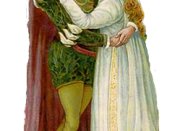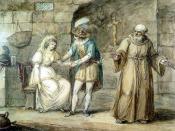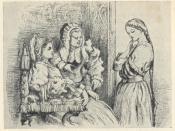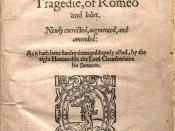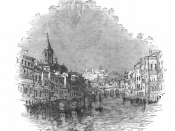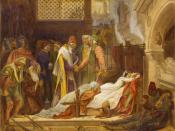In the play Romeo and Juliet by William Shakespeare, many characters react too quickly to things without really thinking before acting. Doing this, also known as "haste is waste"�, causes many problems throughout the play which could have been avoided if the characters weren't so hasty. "Haste is waste"�, the theme in Romeo and Juliet, is displayed a great deal throughout the play.
Death is brought upon the two main characters, Romeo and Juliet, because of both of their hastiness. Romeo and Juliet both kill themselves right after they find out that the other one was dead. When talking to Friar Laurence after word of Romeo's banishment, Juliet quickly agrees to take an unknown substance to knock her out and fool everyone that she is dead, when she is really in a deep sleep. She doesn't even know if it will work or not. After giving the vial to Juliet, she says, "Give me, give me! Oh, tell me not of fear!"� (4.1
Line 121). After a mixup and Romeo gets misinformed that Juliet is dead, he gets so upset and kills himself without really thinking about it. If he only waited a little while, or consulted Friar Laurence, he would find out that Juliet really was not dead. "Well, Juliet, I will lie with thee tonight./ Let's see for means- O mischief, thou art swift/ To enter in the thoughts of desperate men!"� (5.1 Lines 35-36), Romeo says when hearing the news for the first time of Juliet's "death"�. He had only known from one source, Balthasar, of what happened to Juliet and that was one of the first things he had said. Neither of them would have died if they weren't so hasty.
The hastiness of the Capulets made it almost impossible for Romeo and Juliet to be together. The Capulets rushed a wedding for Juliet without knowing she was already married to Romeo. A little after Juliet wed Romeo, the Capulets all of a sudden made a wedding date for Juliet to marry Paris two days after they told her about it. Capulet says to Paris and Lady Capulet of Juliet, on Monday after Tybalt's death, "Wife, go you to her ere you go to bed,/ Acquaint her here of my son Paris' love,/ And bid her, mark you me, on Wednesday next-/ But, soft, what day is this?"� (3.4 Lines 15-18). Juliet was not able to tell her parents about her love for Romeo, since he was a Montague. Her parents would object so quickly, and be outraged. This is a form of haste because the Capulet's would give quick, thoughtless thinking about Romeo, even though he is a gentleman. "O Romeo, Romeo, wherefore art thou Romeo?/ Deny thy father and refuse thy name,/ Or, if thou wilt not, be but sworn my love/ And I'll no longer be a Capulet."� (2.1 Lines 33-36). Juliet says this on her balcony after the first time she meets Romeo, and is asking why he has to be Romeo, a Montague. The only reason she is worried about his identity is because of her parent's. The Capulets had played a great role in the "haste is waste"� theme.
The fighting between the Capulets and the Montagues played a role in the same theme as well. One of the bad fights was between Tybalt and Romeo. After Tybalt accidental killed Mercutio, Romeo gets so mad and needs to seek revenge on him. So, he kills Tybalt out of rage and anger without even thinking about the consequences. "Now, Tybalt, take the "ÃÂvillain' back again/ That late though gavest me; for Mercutio's soul/ Is but a little way above our heads, Staying for thine to keep him company./ Either thou, or I, or both, must go with him."� (3.1 Lines 108-112). Romeo says this quote to Tybalt after killing Mercutio, otherwise meaning that Romeo was going to kill Tybalt, or at least make an attempt to. The Capulets are so resentful after Romeo kills Tybalt, that they demand him to be killed. Instead, the Prince decides to banish him. The Capulets were so quick to say that just because Romeo was a Montague, but it really messed up everything between him and Juliet. After the fight, Lady Capulet comes, without knowing what had happened and says, "He is a kinsman to the Montague,/ Affection makes him false, he speaks not true./ Some twenty of them fought in this black strife,/ And all those twenty could but kill one life./ I beg for justice, which thou, Prince, must give./ Romeo slew Tybalt, Romeo must not live."� (3.1 Lines 159-164). The Capulets were so quick to put down the Montagues, and vice versa.
All this hastiness led up to the death of Romeo and Juliet. Without the quick mindless actions, Romeo and Juliet would have most likely been alive and together. Although the two families were at a civil brawl with each other, the cause of everything was haste.
